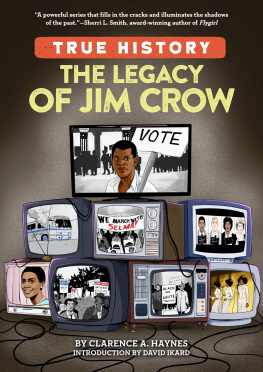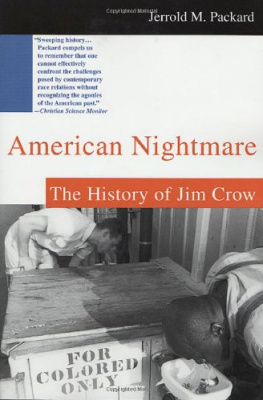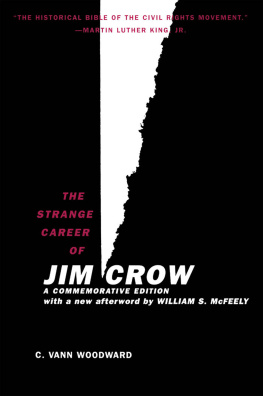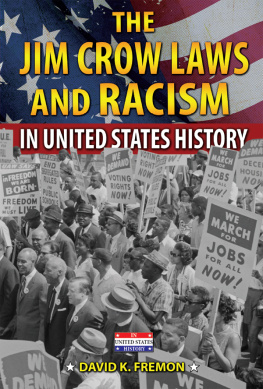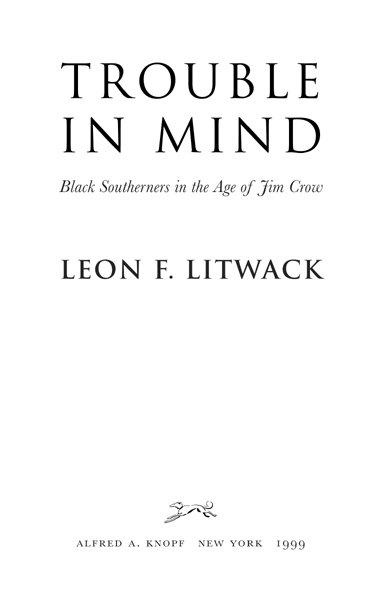THIS IS A BORZOI BOOK PUBLISHED BY ALFRED A. KNOPF, INC.
Copyright 1998 by Leon F. Litwack
All rights reserved under International and Pan-American Copyright Conventions. Published in the United States by Alfred A. Knopf, Inc., New York, and simultaneously in Canada by Random House of Canada Limited, Toronto.
Distributed by Random House, Inc., New York.
www.randomhouse.com
Grateful acknowledgment is made to the following for permission to reprint previously published material:
HarperCollins Publishers, Inc.: Excerpts from Black Boy by Richard Wright, copyright 1937, 1942, 1944, 1945 by Richard Wright, copyright renewed 1973 by Ellen Wright. Reprinted by permission of HarperCollins Publishers, Inc.
MCA Music Publishing: Trouble in Mind, words and music by Richard M. Jones, copyright 1926, 1937, by MCA Music Publishing, a division of MCA Inc., copyright renewed. International copyright secured. All rights reserved. Reprinted by permission of MCA Music Publishing.
Library of Congress Cataloging-in-Publication Data Litwack, Leon F. Trouble in mind : Black southerners in the age of Jim Crow / by Leon F. Litwack.1st ed.
p. cm.
Continues: Been in the storm so long.
eISBN: 978-0-307-77322-7
1. Afro-AmericansSouthern StatesHistory18771964.
2. Afro-AmericansSegregationSouthern StatesHistory.
3. Southern StatesHistory18651951.
4. Southern StatesRace relations.
I. Title.
E185.6.L68 1998
975.00496073dc21 97-49465
Published March 16, 1998
PHOTOGRAPHIC CREDITS
Insert photographs courtesy of:
Doris Ullman Collection, Special Collections, University of Oregon; Polk Collection, Fisk University; Richard Samuel Roberts Collection, South Caroliniana Library, University of South Carolina
v3.1
For Evan and Reva,
Ann, John, and Nadia,
with love
Trouble in mind, Im blue,
But I wont be always,
For the sun goin shine in my back door some-day.
Trouble in mind, thats true,
I have almost lost my mind;
Life aint worth livinfeel like I could die.
Im gonna lay my head on some lonesome railroad line,
Let the two nineteen pacify my troubled mind.
Trouble in mind, Im blue,
My poor heart is beatin slow,
Never had so much trouble in my life before.
Im gonna lay my head
On that lonesome railroad track.
But when I hear the whistle,
Lord, Im gonna pull it back.
Im goin down to the river
Take along my rocking chair,
And if the blues dont leave me,
Ill rock on away from there.
Well, trouble, oh, trouble,
Trouble on my worried mind,
When you see me laughin,
Im laughin just to keep from cryin.
CONTENTS
PREFACE
Nowhere is the paradox of black life in the United States more graphically revealed than in Ralph Ellisons portrayal of the black odyssey in Invisible Man. In the opening scene, the nameless hero is deeply moved by the words of his dying grandfather. After emancipation, his grandparents had stayed on the same place, they had worked hard, and they had brought up their children in the etiquette of accommodation and survival. On his deathbed, however, the grandfather confessed to having lived a more complex life.
Son, after Im gone I want you to keep up the good fight. I never told you, but our life is a war and I have been a traitor all my born days, a spy in the enemys country ever since I give up my gun back in the Reconstruction. Live with your head in the lions mouth. I want you to overcome em with yeses, undermine em with grins, agree em to death and destruction, let em swoller you till they vomit or bust wide open.
The outburst visibly shook the family, some thought he had lost his mind, and the younger children were quickly ushered out of the room. Learn it to the young uns, the grandfather whispered intensely, and then he died. My folks were more alarmed over his last words than over his dying, the hero recalled. It was as though he had not died at all, his words caused so much anxiety. I was warned emphatically to forget what he had said. But he could never put it out of his mind.
The hero had still not sorted out the implications of his grandfathers words when the most prominent whites in town invited him to repeat for them his graduation speech, in which I showed that humility was the secret, indeed, the very essence of progress. But when summoned to the main ballroom of the leading hotel for this occasion, he found himself in the midst of a noisy, raucous smoker. Along with some other black youths, he was compelled to participate in a battle royalthat is, to undergo a racial baptism. With an audience of whites looking on, the youthsdressed in boxing shorts and boxing gloveswere rushed to the front of the ballroom. The place smelled of cigars and whiskey. A sea of faces, some hostile, some amused, ringed around us, and in the center, facing us, stood a magnificent blondestark naked. The woman danced before them, accentuating the American flag tattooed upon her belly. The whites pretended to be angry if the youths looked at her, insulted if they did not.
The crowd attending the smoker was made up of the better sort, the leading citizens in the communitybankers, lawyers, judges, doctors, merchants, teachers, one of the more prominent pastors, and the school superintendent who had arranged for the hero to give his speech. With sadistic delight, they tormented the black youths in order to humiliate them, to embarrass them sexually, to degrade them, and to underscore the unmistakable limits placed on their aspirations and rewards in a white mans society.
Once the naked woman was removed from the arena, the crowd prepared itself for the climactic scene: the battle royal. The black youths were thrown into the ring, blindfolded, and compelled to fight each other; the last survivor would be designated the winner. By this time, the audience was nearly hysterical, and then, finally, the ordeal ended. Having performed their roles to the amusement and satisfaction of the crowd, the black youths prepared to receive their promised monetary reward, but not until they had fought among themselves for it, scrambling for the coins thrown to them on an electrified rug. The shiny gold coins turned out to be worthless brass pocket tokens advertising a new automobile.
No historian could have improved upon the scene. This is more than a group of sadistic white men having fun at the expense of a group of black boys. It is a racial rite of passage, a necessary initiation into the racial ethics of the white South. It is a ritual in preservation of caste lines, Ellison explained, a keeping of taboo to appease the gods and ward off bad luck. It is also the initiation ritual to which all greenhorns are subjected.
The grandfathers dying imperative and the battle royal provide the overture for the extraordinary black odyssey in Invisible Man, the struggle of one individual to define himself and maintain his humanity, integrity, and self-respect. Even as the ambitious hero attends college, even as he is encouraged to believe he is making remarkable progress, even as he embraces the white mans work ethic and success credo, even as he accommodates himself to the white mans ways of thinking and acting, he finds his expectations betrayed and his goals unreachable. He moves not upward but downward, and he ultimately leaves the South altogether, moving from a static rural society to an industrializing, urbanizing, and more promising North. But with every step, he must again perform the rituals expected of him and play the roles defined by whites, all of them equally dehumanizing, equally degrading, equally unrewarding. For hundreds of thousands of southern black men and women, this odyssey summed up the entirety of their lives.


